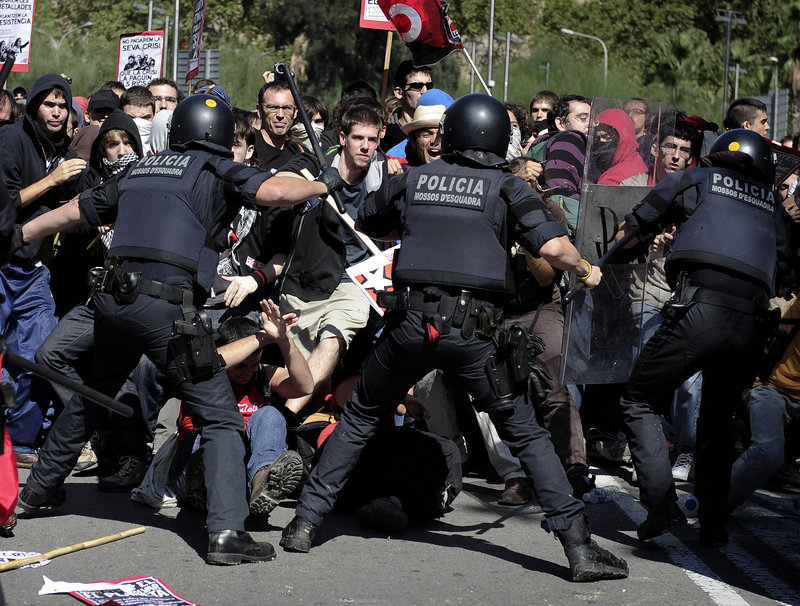BRUSSELS – European unions orchestrated a crescendo of anti-austerity protests across the continent Wednesday, sending workers ranging from Greek doctors to Spanish bus drivers to Lithuanian engineers out to vent over job cuts, higher taxes, soaring unemployment and smaller pensions.
One man even blocked the entrance to the Irish parliament with a cement truck, decrying the country’s enormous bank bailouts with blood red slogans like “Toxic Bank” and “All politicians should be sacked.”
Waves of demonstrators clad in bright red, green and blue union jackets marched through Brussels toward European Union buildings, aiming to reinforce the impact of Spain’s first nationwide strike in eight years.
Unions estimated the turnout in Brussels at 100,000 people. Some protesters there confronted riot squads with a sit-down protest in the middle of the street. About 150 people were detained, some in scuffles with police.
Strikes or protests took place Wednesday in Greece, Portugal, Ireland, Slovenia and Lithuania, all aimed at the budget-slashing, tax-hiking, pension-cutting austerity plans that European governments have implemented to try to control their debt.
The march in Brussels came as the EU Commission proposed new penalties to punish member states that have run up deficits, mainly to fund social programs in a time of high unemployment. The proposal, backed by Germany, was running into strong opposition from France, which wants elected politicians, not rigid accounting rules, to decide on what sanctions big-spending countries should face.
“It is a bizarre time for the European Commission to be proposing a regime of punishment,” said John Monks, general secretary of the European Trade Union Confederation. “How is that going to make the situation better? It is going to make it worse.”
Unions fear workers will become the biggest victims of an economic crisis set off by bankers and traders, many of whom were rescued by massive government intervention.
“It is not right that people on low salaries have to pay to prop up the country. It should be the banks,” said Belgian demonstrator Evelain Foncis.
Several governments, already living dangerously with high debt, were pushed to the brink of financial collapse and have been forced to impose punishing cuts in wages, pensions and jobs — measures that have brought workers out by the tens of thousands over the past months.
Send questions/comments to the editors.



Success. Please wait for the page to reload. If the page does not reload within 5 seconds, please refresh the page.
Enter your email and password to access comments.
Hi, to comment on stories you must . This profile is in addition to your subscription and website login.
Already have a commenting profile? .
Invalid username/password.
Please check your email to confirm and complete your registration.
Only subscribers are eligible to post comments. Please subscribe or login first for digital access. Here’s why.
Use the form below to reset your password. When you've submitted your account email, we will send an email with a reset code.